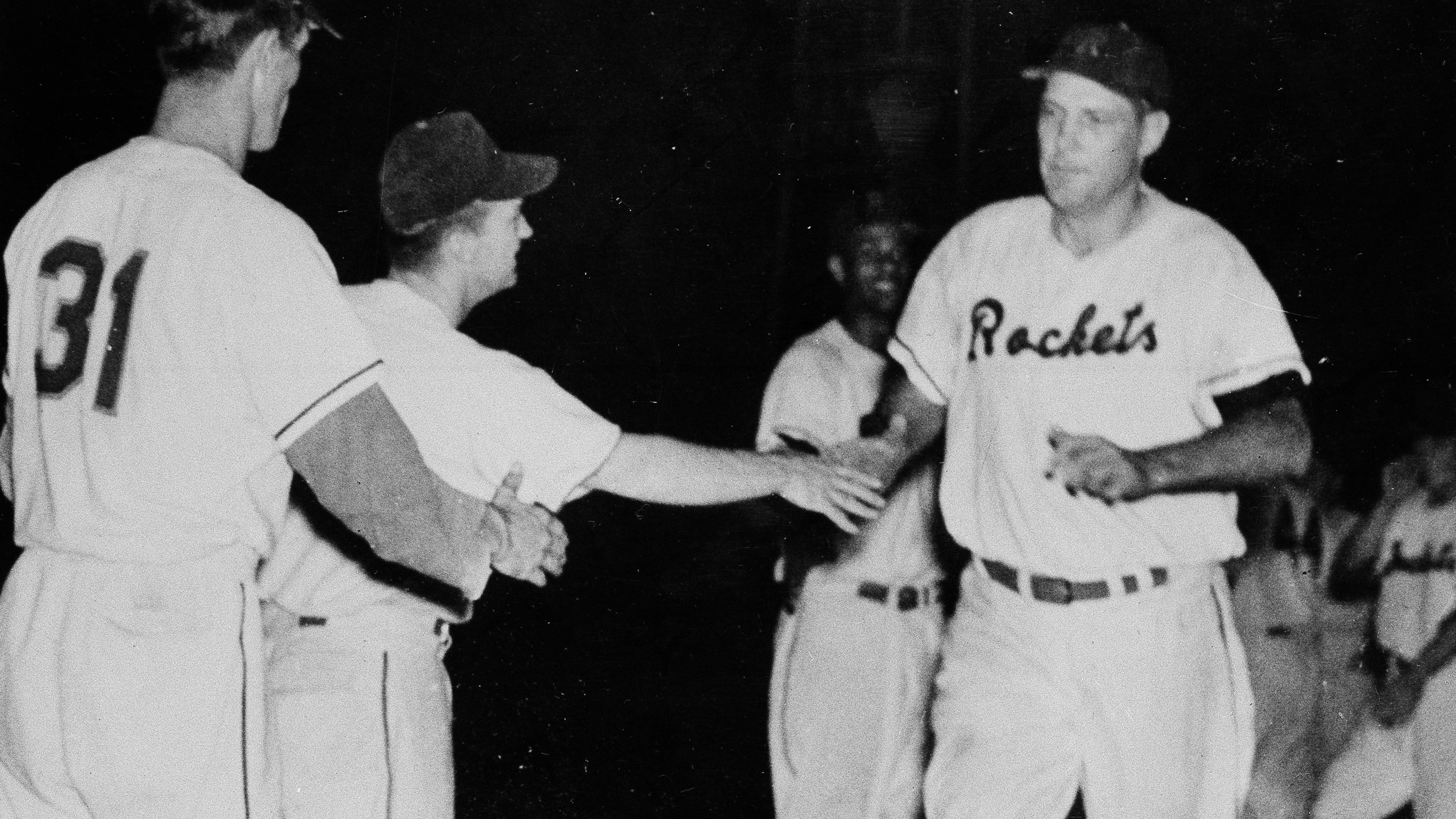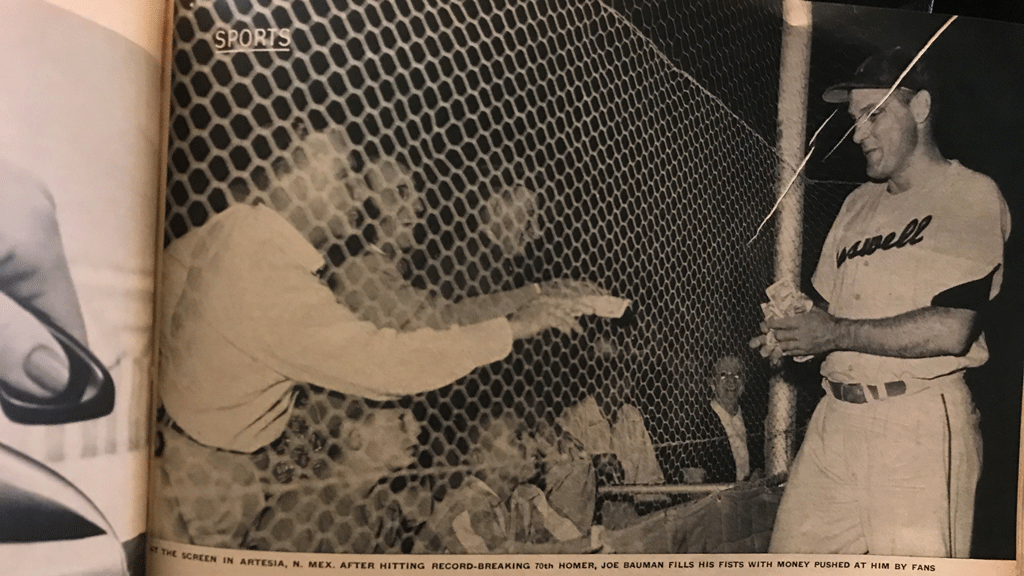Bauman soared to record with Roswell in '54

He wasn't gregarious. He wasn't interested in fame. He never made as much money as the President of the United States. He was, in some ways, the anti-Babe Ruth. And yet there's no denying that Joe Bauman's accomplishments make him a Ruthian figure. Although he died a decade and a
He wasn't gregarious. He wasn't interested in fame. He never made as much money as the President of the United States. He was, in some ways, the anti-Babe Ruth. And yet there's no denying that Joe Bauman's accomplishments make him a Ruthian figure.
Although he died a decade and a half ago, he'll live on in Minor League Baseball for a long time to come. His most noteworthy feats aren't commonly known, but his name is familiar to most who closely follow the Minors -- each year, the player who leads all levels in home runs receives the Joe Bauman Award, with the honor going to the likes of the Mets'
Roswell, New Mexico, was home to some 30,000 people in the mid-1950s, an outpost about 90 miles from the border with West Texas and some 200 from Albuquerque. In popular lore, a UFO crash-landed outside of Roswell in 1947, but whatever actually happened that day, it didn't prepare the city for Bauman's '54 campaign, when he set a professional single-season home run record with 72 long balls in 138 games while batting .400/.535/.916 with 224 RBIs.
The Rockets belonged to the Longhorn League, a circuit that began at the Class D level in 1947, was upgraded to Class C in 1951 and was reorganized as the Southwest League by 1956. Bauman's record-setting season was his first with the club after he played two with Longhorn-rival Artesia. (He'd also played four seasons elsewhere in pro ball in the '40s.)
A small-town guy from Oklahoma, Bauman was thrust into the national spotlight by the end of his '54 campaign. Regional media took notice much earlier. On May 21, the man the papers called "Big Joe" drilled two homers -- giving him 16 in the young season -- in a 2-for-3, seven-RBI performance during an 11-6 win at Carlsbad. By the time the Rockets came home from that road trip, Bauman had to pick up a hefty package.
"Homer Glover, bull of the woods at Glover Packing Co., said the other day that Joe Bauman, big first sacker for the Roswell Rockets, had collected six hams from him in one day," the Roswell Daily Record's "Good Morning" column reported on May 30. "The Glover concern offers a ham to every Rocket who parks one..."
The early-season showing was so impressive that one member of the press made a bold -- and, as it turned out, correct -- prediction no later than June 3.
"If Joe Bauman continues his home run pace, and the pitchers continue to pitch to him, he could beat all records for round trippers in Organized baseball," wrote Tommy Hart in his "Looking 'em Over" column in the Big Spring (Texas) Daily Herald.
"Bauman seems to hit his four-masters in clusters. He'll go three or four games without getting one, then rap two or three. ... The Roswell first sacker is a hard one to fool on a pitch. The most effective delivery against him seems to be 'high and tight' -- up around the letters and inside. He is apt to put that one in the next precinct, though."
That up-and-in advice makes sense, considering Bauman's approach. A 6-foot-4, 235-pound left-handed hitter, Bauman was apparently a pioneer of the launch angle.
"Joe would get up in the batter's box, and he would loop the balls up in the air," said Toby Smith, author of "Bush League Boys: The Postwar Legends of Baseball in the Southwest," who was among the last people to interview the slugger before Bauman's death in 2005.
"They'd really sail, right down the line. Long shots," Smith said. "He golfed the ball, essentially, from what I remember and from what people tell me."
The technique served Bauman well at home. The league -- with windy, high-elevation ballparks -- was a good one for power hitters, and the Rockets' Fair Park Field corner in right was 329 feet from home plate.
"[He] had a tendency to chase a keeling-over curve," Smith wrote in "Bush League Boys."
"Some of Bauman's [long] balls traveled so far they were never found. Bauman's strategy at the plate was no secret, according to the San Angelo Colts' Bob Gregg, who pitched to him several times: 'Hit the ball out of the park.'"
Through 48 games, he'd homered 23 times. He belted No. 26 on June 13, in the Rockets' 55th game of the season. The Amarillo Daily News' Harry Gilstrap noted in a column that ran two days later that Bauman was behind the pace to break the record. That mark was 69, which had been done twice. Joe Hauser hit it over 153 games with the 1933 Double-A Minneapolis Millers, and Bob Crues did it in 140 games for the 1948 Class C Amarillo Gold Sox of the West Texas-New Mexico League.
Crues and Bauman were teammates on Amarillo in 1946-1947. Over the two seasons, Bauman crushed 86 homers in 266 games. That got him signed away from the unaffiliated Gold Sox to the Boston Braves. He spent 1948 with the Double-A Hartford Chiefs (getting one at-bat with the Triple-A Milwaukee Brewers).
By all accounts, he was miserable during that time. Bauman began his pro career in Arkansas in 1941 and, after serving in the Navy through World War II, he enjoyed playing in Texas. The East didn't suit him, and he didn't play especially well, batting .275 with 10 home runs over 98 games. He wasn't making any more money than he'd made in the West Texas-New Mexico League, where fans passed cash through the fence behind the bullpen when players went yard.
"Bush League Boys" details the response Bauman sent to Boston when the Braves offered him a contract for 1949.
"I can make more money selling 27-inch shoelaces on a street corner in Oklahoma City than I can playing for you," he wrote.
• Shop the Hometown Collection »
But because of the reserve clause, he couldn't play elsewhere in pro ball until the Braves officially let him go. Bauman found a spot with the remote and semi-professional Elk City (Oklahoma) Elks, and he played there for three years. During that stretch, he opened his first Texaco station, along with a teammate. He also got back to mashing taters. His power drew the attention of Earl Perry, manager of the Longhorn League's Artesia Drillers. Perry, Smith wrote, offered Bauman "a grand a month … plus another [$1,000] to sign," and also threw some money the Braves' way to free the heavy hitter from the reserve clause and bring him to New Mexico.
At Artesia, he posted back-to-back 50-homer seasons. Through the first, he retained his interest in his Elk City Texaco station. In the second, he served as the Drillers' manager for part of the year, which, per his Society of American Baseball Research biography, "he did not like and rarely [discussed]."
Perry moved to Roswell to become the general manager of the Rockets for '54, and -- largely because a filling station in town was for sale -- was able to lure Bauman away from the Drillers. Happy running Joe Bauman's Texaco Service Station, he began his assault on his old teammate's record. Crues, who retired in 1953, had seemingly no competitive or sore feelings about Bauman's pursuit.
"Absolutely none that I know of," Smith said. "From what I know, Bob Crues was not that kind of person. He just wanted to play baseball like Joe."
And Bauman was playing at his best. On Aug. 30, he slugged No. 64 at Roswell's Joe Bauman Night. Needing five dingers with seven games to play, Bauman wasn't exactly an obvious bet to tie the record. On Aug. 31, though, he set a different record -- most home runs in a single Longhorn League game -- with four.
"Bauman's home run hitting spree Tuesday night netted him around $500 through the screens," Jack Holden wrote in the Abilene Reporter News, "probably another record or near it if the facts were known."

The Sept. 20, 1954 issue of Life featured a photo of Bauman receiving "screen money."
On Sept. 1, with six games left in the season and Bauman at 68 homers, Rockets player/manager Pat Stasey put him in the leadoff spot to maximize the number of at-bats he'd get. That night, he swatted a shot the United Press reported hitting six inches below the top of the wall. The next night, he hit No. 69, matching the record with a 375-foot jack.
But there he stayed, stuck with a tie, going into the last day of the season. The Rockets played a doubleheader at Artesia, with Drillers pitchers vowing to pitch to Bauman after Big Spring hurlers had given him nothing but junk over the previous two nights. Jose Gallardo, a 148-pound right-hander who'd made 25 appearances for Roswell before ending his lone professional season with Artesia, threw Bauman a low fastball in the first at-bat of the game. Bauman drilled it out of the yard. He belted two more in the second game.
It'd be reasonable to assume his 72-homer performance launched him to a higher level for the rest of his playing days. Reasonable, but wrong.
As he approached the historic mark, he told the Associated Press' Robert Green, "I've got my filling station here and I'll probably play the rest of my ball right here in Roswell."
Indeed, he did. After two more seasons with the Rockets (combining for 63 more homers over 183 more games), Bauman hung up his spikes to work in his gas station full time and, eventually, manage a beer distribution company. He stayed in Roswell for the rest of his life.
When Barry Bonds surpassed his mark for most home runs in a pro baseball single season in 2001, Bauman was following the chase.
"I never thought it'd last this long," he told the AP. "I was watching on TV when Barry Bonds hit that last one. It didn't bother me or anything. I just thought, 'There goes my record.'"
That mentality was natural for a small-town guy who just wanted to play some baseball, and his record still stands at the Minor League level.
"Joe was a country boy," Smith said. "He was a good guy. Everybody in Roswell, where he lived and worked, loved the guy. He was a simple man. I'm not sure he really regretted never getting to the Major Leagues. ... His statistics were unbelievable. Even now, those statistics hold up."
Josh Jackson is a contributor to MiLB.com. Follow and interact with him on Twitter, @JoshJacksonMiLB.
